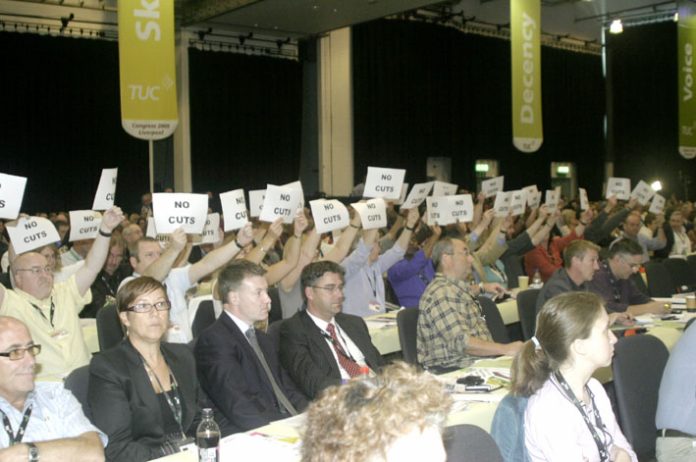Chancellor Darling yesterday confirmed that VAT will be restored to 17.5 per cent on January 1st, and that inflation will rise to 3.0 per cent in 2010, while national insurance contributions will be raised by 0.5 per cent in 2011.
In his Pre-Budget Report speech, Darling announced new attacks on the unemployed and another £2.5bn for military operations in Afghanistan in 2010.
He began by telling MPs that ‘across the world, there remain risks to the recovery. Oil prices are volatile. Recent market reaction to financial problems in Dubai highlights just how fragile world confidence remains.’
Darling added: ‘To cut support now could wreck the recovery, that’s a risk I am not prepared to take.’
Darling boasted that ‘over three million people have been helped off the claimant count in the last year’ and went on to announce: ‘I have decided that from next month no-one under-24 needs to be unemployed for longer than six months before being guaranteed work or training.’
Also that ‘we will ensure the over-50s receive specialist and tailored support, to equip them with the confidence and skills needed to get a job.’
He added: ‘To make it easier for those over 65 to receive Working Tax Credit, we will reduce the minimum number of hours they need to work to be eligible.’
Later in his speech he said ‘we will offer financial support for up to 10,000 undergraduates from low-income backgrounds to take up short internships in industry, business and the professions.’
Meanwhile, he said the basic state pension ‘will rise by 2.5 per cent in April’.
Child benefit and some disability benefits will rise by 1.5 per cent in April.
He predicted that the UK economy will contract by 4.75 per cent this year but will return to growth of between one and 1.5 per cent in the fourth quarter.
He went on to say: ‘Backed by legislation introduced today, the government will ensure: public sector net borrowing, as a share of GDP, falls every year and is more than halved by 2013-14; and net debt, as a share of GDP, is falling in 2015-16.’
He added: ‘At the Budget, I forecast that public sector net borrowing would be £175bn this year and fall to £97bn in 2013-14.
‘Because of the severity of the recession my forecast for borrowing this year is £178bn.
‘Next year it will fall to £176bn. And, as the economy recovers and the deficit reduction plan starts to take effect, then falls to: £140bn; £117bn; and reaches £96bn in 2013-14, slightly lower than I forecast in April; before falling to £82bn in 2014-15.’
He went on to announce that there would be no ‘windfall tax’ on the bankers, but that a ‘one off levy of 50 per cent would be imposed on any individual discretionary bonus above £25,000’ paid to bankers.
Darling went on to declare that ‘Between 2005 and 2008, we delivered £26.5bn of annual efficiency savings, more than we promised. And between 2008 and 2011, we are delivering further efficiencies worth over three per cent of total department spending per year.
‘This week, we announced our plans to deliver another round of savings, amounting to £12bn a year by 2013-14. . . And we will sell those assets that can be managed better by the private sector.’
‘Today I am able to announce £5bn of savings from spending programmes, including:
‘Phasing-in the roll-out of pension personal accounts; cutting back on the scope of major IT projects; reforming legal aid and outsourcing inefficient prisons; refocusing regeneration spending so it is spent where it is needed most; cutting the cost of residential care by supporting older people to stay in their homes.’
He went on to warn that ‘by 2012 contributions by the state to public service pensions for teachers, local government, NHS and the civil service will be capped, saving around £1bn a year.’
On pay he added: ‘The senior civil service will take the lead with a cut in its pay bill of up to £100m over three years,’ and that ‘for the two years from 2011, we will seek to ensure that all public sector pay settlements be capped at one per cent.’
But ‘as with previous pay decisions, we will recognise the special circumstances of the armed forces’.
He added: ‘Our first priority must be to make sure our armed forces have all the resources they need. . . .
‘For next year, I can announce that a further £2.5bn will be set aside for military operations in Afghanistan.
‘At the same time, we will continue to improve the effectiveness of core defence spending, reducing the civilian workforce and restructuring the department.’
He also announced: ‘I intend to increase all employer, employee and self-employed rates of National Insurance by a further half a per cent from April 2011.’
He said: ‘This will raise £3bn a year from 2011-12.’
He also announced extending free school meals to another 500,000 poor families.
